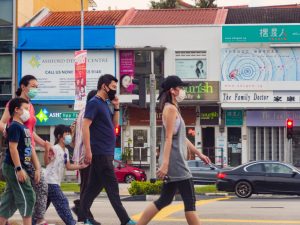Singapore has significantly scaled back its COVID-19 restrictions, ending a two-year-long indoor mask requirement and allowing travelers who are not fully vaccinated to skip quarantine on arrival to the country.
Under the new regulations, which were first announced by Prime Minister Lee Hsien Loong in his National Day Rally speech on August 21, masks will no longer need to be worn indoors. There are two major categories of exceptions. The first is healthcare facilities, residential care homes, and ambulances, in addition to indoor premises within hospitals and polyclinics. Masks also need to be worn on public transport, including trains, MRT carriages, public buses, and indoor public transport facilities, such as MRT platforms and boarding areas within bus interchanges.
“The reason is that, we have identified areas where essential services are being carried out in enclosed, crowded spaces and which are frequently used by vulnerable persons,” Finance Minister Lawrence Wong said in announcing the details of the new policy on August 24.
Along with Singapore’s lifting of an outdoor mask-wearing requirement in March, the move marks the city-state’s step toward living with COVID-19, nearly three years after the first cases of the virus were identified in Wuhan, China.
Since then, Singapore has recorded 1.8 million positive COVID-19 cases and 1,590 deaths from the disease, but has maintained robust masking requirements and other health measures even as many other Southeast Asian nations have returned to the pre-COVID-19 status quo ante.
In many ways, this adjustment is long overdue, given that some 91.72 percent of the population has been fully vaccinated, while nearly a third of the population has been infected by COVID-19. Health experts told the Straits Times that because the country had survived two surges of the Omicron variant of COVID-19 – one that peaked in February, and another in July – without its healthcare system being overwhelmed, it was ready to scale back restrictions.
Under the package of new regulations, Singapore will now allow non-fully vaccinated travelers quarantine-free travel to the city-state. Visitors who are not fully inoculated will still be required to test negative for COVID-19 within two days prior to their departure for Singapore. However, they will no longer need to serve a 7-day quarantine at home or at their place of residence.
In announcing the details of the new regulations last week, Wong, who is also the co-chair of Singapore’s COVID-19 task force, described the further easing of safety and border measures as a “significant milestone.” But he said the country’s 5.6 million people must still “be mentally prepared for any sudden change because we don’t know how this virus will mutate and what the next variant will look like.”

































